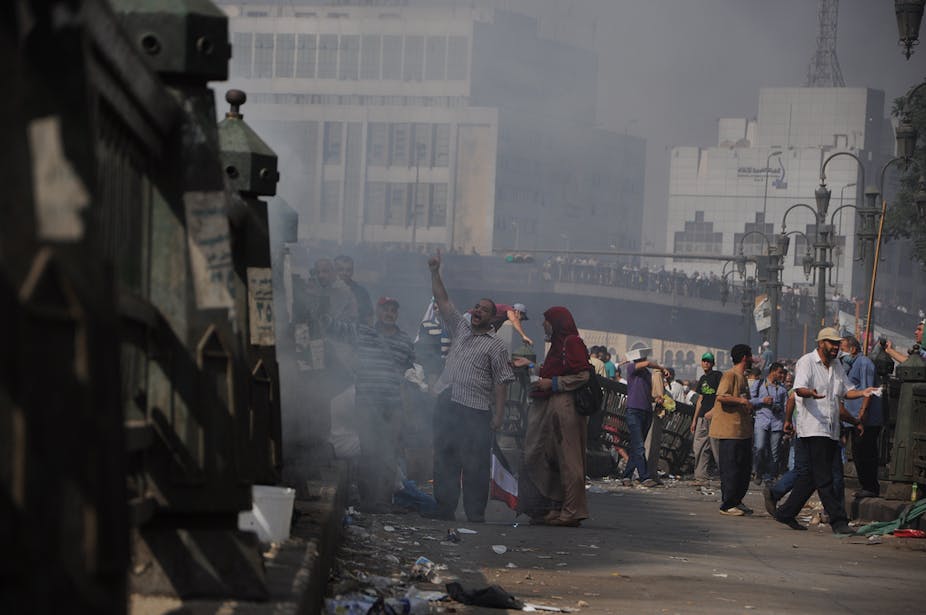The release from prison today of Hosni Mubarak, the former strongman whose downfall in 2011 was hailed as the start of the Arab Spring in Egypt, could be the moment at which the counter-revolution has prevailed.
Thousands of lives lost, tens of thousands injured, huge numbers of people detained and the prospect of continuing violence - especially if the Muslim Brotherhood, which was emerging as a legitimate player after years of being denied legal recognition, is driven back underground and forced to resort to non-legitimate political activity.
Nightmare scenario
The world can see what an important moment this is. All sides have sent envoys to encourage a peaceful and democratic solution. Today is the turn of the EU’s foreign ministers meeting in Brussels to puzzle out a way of putting pressure on the warring parties to find a peaceful way through the crisis.
The alternatives are too awful to contemplate: Money, arms and training flowing to Islamic radicals to engage in violent confrontations. Splits within the army as senior officers divide along the lines of those who support a military take-over and those for whom distaste at shedding the blood of innocent civilians (and there are many) will force them into the opposing camp. And, most frighteningly of all, Israel being drawn into the conflict by bloodshed spilling across from the Sinai, sparking a bloody regional conflict with unknown and terrifying consequences.
It’s hard to see what can be done to avoid those outcomes, but something must be done and very soon.
Alternative roadmap
Here are a few suggestions: first, those people - both in the army and from the political establishment - whose actions led to the spilling of Egyptian bloody must be put on trial and brought to justice. They cannot continue to be involved in Egyptian politics.
The army must then identify one of its senior offices to lead negotiations. The negotiating team must also include a representative from the Islamists, the liberals, and possibly the secretary-general of the Arab League and the Organisation of the Islamic Conference or Organisation of African Unity as observers.
Negotiations should aim to reach a consensus appointment for an interim prime minister and a technocrat cabinet. Once this is done the military must pledge to completely withdraw from Egyptian political life. The military-backed interim government must immediately resign and take responsibility for the atrocities that have been committed against civilians - and for agreeing to come to power backed by the military’s tanks.

Local and international human rights organisations must be given the authority to conduct a thorough and objective investigation, gathering an accurate tally of all the dead and injured and the circumstances in which they suffered. The dead must be given honourable burials to relieve the pain of the afflicted families and diffuse the desire for revenge.
An independent fact-finding commission should be established and allowed to have access to all parties as well as to hold impartial and thorough investigations of those who instigated, planned, committed or advocated violence.
All those who took part in the massacres must face open and fair trials, while all the detainees arrested for political reasons since June 30 must be released.
Restore democratic legitimacy
In order to act within the bounds of the constitution, the process must restore some legitimacy to Mohammed Morsi, who was deposed as president rather than voted out. He should immediately appoint the consensus prime minister nominated by the negotiating committee and immediately submit his resignation as a gesture to end further division and bloodshed.
The main purpose of new prime minister and cabinet would be to call for parliamentary elections within 60-90 days and presidential elections within 60-90 days after that. Meanwhile, the new government should concentrate on promoting reconciliation between all political parties, as well as instituting transitional justice.

During this transitional period, the cabinet must appoint a committee to review all the controversial articles in the new constitution which should then presented to the new parliament once elected. In the meantime, all political parties must pledge to refrain from street demonstrations while the right of the people to hold peaceful protests must be protected.
Time for healing
For the past 32 months, the people of Egypt, especially its youth, have paid dearly in order to gain their freedom, build a genuine democracy, restore their dignity and assert their will. The bloodshed, arrests, terror and suborning of Egypt’s media over the past six weeks has broken their heart.
Now the prospect of the release of Mubarak is seen as a sign that the army is rolling back the changes that the people of Egypt risked all. Let the army go back to what they are supposed to do - let them focus on restoring security and protecting the country’s borders.

